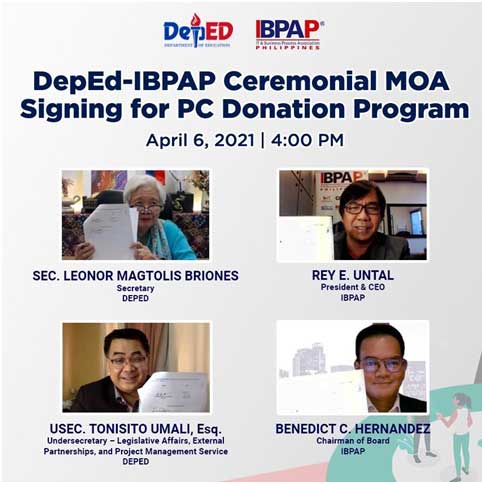
The Department of Education (DepEd) is collaborating with the IT and Business Process Association of the Philippines (IBPAP) to make it easier and more cost-efficient for IT-BPM firms to donate preowned but fully functional IT equipment to DepEd public schools around the country.
The initiative, which is the result of extensive discussions with a number of public and private sector entities, will minimize operational requirements and optimize the turnover process for the members of IBPAP and its partner associations (Animation Council of the Philippines, Inc., Global In-House Center Council, Contact Center Association of the Philippines, Game Developers Association of the Philippines, Healthcare Information Management Association of the Philippines, and Philippine Software Industry Association).
“Through the partnership, we will be able to directly address the challenges that organizations often face when making a donation, including taxes and other related costs, documentation, lengthy timelines, and incurred manhours,” said Rey Untal, President and CEO of IBPAP. “Once fully implemented, companies will hopefully feel more encouraged to initiate and sustain their individual outreach efforts.”
This milestone achievement comes at a very opportune time given the growing resource needs of the public education system. Additionally, the mandatory refresh of digital devices within the IT-BPM sector assures that there is a readily available supply of computers to go around.
Also, as the Philippines’ largest job generator, the industry has always recognized the inestimable role of the Filipino talent to its sustained growth. Accordingly, IBPAP has made it a priority to ensure that they are provided the best opportunities to attain, enhance, and harness their skills and capabilities.
Given this, it stands to reason that beneficiaries of the program are students and teachers in the public education system who are in need of reliable learning tools, especially as they transition to online and blended schooling amid the COVID-19 pandemic.
Education Secretary Leonor Magtolis Briones also underscored the role of technology in cultivating an environment that’s conducive for learners, “We cannot talk about quality education without teaching our learners of the intricacies of technology, communication, creativeness, and invention.”
“The contributions of the IT-BPM sector will surely make a great difference in DepEd’s efforts because while we already receive thousands of computer donations, we must also keep in mind that there are 26 million learners that need to be exposed, as early as possible, to the benefits and usefulness of technology if they are to survive in the real world,” she added.
###
About the Information Technology & Business Process Association of the Philippines (IBPAP)
The Information Technology and Business Process Association of the Philippines (IBPAP) is the enabling association for the information technology and business process management (IT-BPM) industry in the Philippines. IBPAP serves as the one-stop information and advocacy gateway for the industry. With over 300 industry and support-industry members, and six associations—the Animation Council of the Philippines, Inc., Global In-House Center Council, Contact Center Association of the Philippines, Game Developers Association of the Philippines, Healthcare Information Management Association of the Philippines, and Philippine Software Industry Association—IBPAP plays a pivotal role in sustaining rapid growth of the IT-BPM industry by working to ensure an enduring supply of high-quality labor, supporting service innovation, and providing country visibility.
IBPAP assists investors in setting up operations easily and quickly in the Philippines. Relevant research, introductions to key government and industry officials, and a series of briefings at each step of the investment process ensure a seamless development process. Ongoing support is provided through a wide variety of initiatives, including programs for HR development, business development, knowledge sharing, and networking opportunities.






















